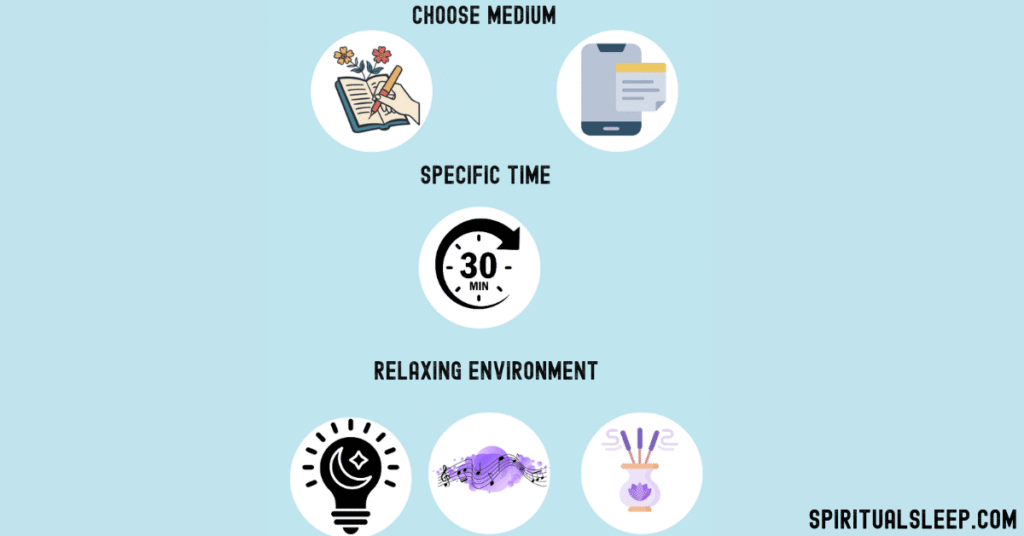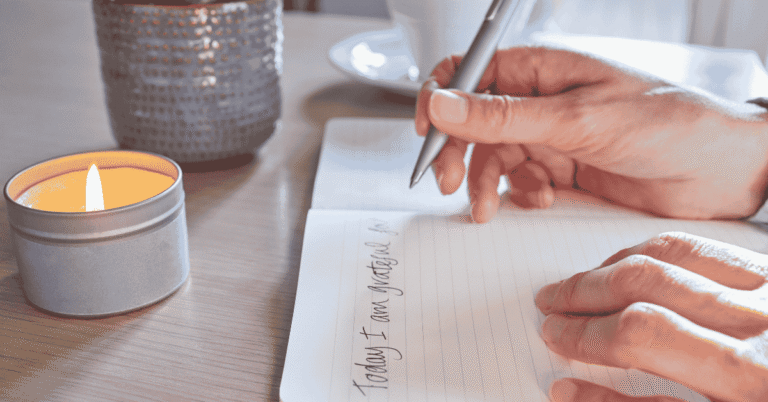How to Do Journaling for Better Sleep: A Comprehensive Guide
Sleep is one of the most important factors in maintaining physical and mental health, yet many people struggle to get enough of it. As a medical doctor, I’ve seen how chronic sleep problems can affect my patients’ lives, from decreased productivity to increased anxiety.
One natural and highly effective tool I often recommend is journaling. In this article, we’ll dive deep into how to do journaling for better sleep, why it works, and how to make it part of your nightly routine.
Table of Contents
Why Is Sleep So Hard to Achieve?
For many people, falling asleep isn’t as simple as closing their eyes. Stress, anxiety, racing thoughts, and even excitement about the next day can keep the mind active long after the body is ready to rest. Some common reasons people struggle with sleep include:
– Racing Thoughts: Many people replay events of the day or worry about tomorrow when they lie down.
– Anxiety:Stress about work, relationships, or health can make it difficult to relax.
– Overstimulation: Screen time before bed or an overactive mind can prevent the brain from winding down.
The Negative Effects of Poor Sleep
When you don’t get enough quality sleep, the consequences can be significant:
– Cognitive Impairment: Lack of sleep affects memory, focus, and decision-making.
– Mood Disorders: Poor sleep is linked to anxiety and depression.
– Health Risks:Chronic sleep deprivation increases the risk of heart disease, diabetes, and obesity.
Why Are Traditional Solutions Not Always Effective?
While there are many remedies for improving sleep, ranging from medications to lifestyle changes, not all work for everyone. Some common challenges include:
1. Dependency on Medications: Sleep aids can lead to dependency or grogginess the next day.
2. Inconsistent Results: Techniques like meditation or herbal teas may not address underlying issues like stress or racing thoughts.
3. Lack of Awareness About Journaling: Many people underestimate how writing down their thoughts can help them sleep better.
Why Journaling Works
Journaling is a simple yet powerful practice that helps declutter your mind before bed. By putting your thoughts on paper, you can process emotions, organize tasks, and let go of worries that might otherwise keep you awake.
The Science Behind Journaling
Researchhas shown that journaling reduces cognitive arousal, the overthinking or mental activity that prevents sleep. A study published in Behavioral Sleep Medicine found that participants who wrote down their thoughts before bed fell asleep faster than those who didn’t.
Benefits of Journaling for Better Sleep
1. Reduced Anxiety
Journaling helps externalize worries so they don’t stay trapped in your mind. Writing about what’s bothering you allows you to confront those concerns head-on rather than letting them fester.
Example: If you’re worried about an upcoming presentation at work, writing down your fears and potential solutions can help you feel more prepared and less anxious.
2. Improved Sleep Quality
By calming your mind through journaling, you’re more likely to experience deep, uninterrupted sleep cycles. This practice helps reduce nighttime awakenings caused by stress or overthinking.
Example: A patient once told me she woke up multiple times a night worrying about her unfinished tasks. I suggested she write a detailed to-do list before bed. Within weeks, her sleep quality improved dramatically because she no longer felt the need to mentally rehearse her tasks during the night.
3. Emotional Regulation
Journaling allows you to process emotions like anger, sadness, or excitement in a healthy way. This emotional release makes it easier to relax both mentally and physically before bed.
Example: If you’ve had an argument with a loved one during the day, journaling can help you reflect on what happened and let go of lingering tension.
4. Increased Mindfulness
The act of writing encourages mindfulness by focusing your attention on the present moment. This practice helps shift your mind away from future worries or past regrets, two major culprits behind sleepless nights.

How to Start Journaling for Better Sleep
1. Choose Your Medium
Decide whether you want to use a physical notebook or a digital app for journaling. Both have their advantages:
– Notebook: Writing by hand can feel more personal and therapeutic.
– Digital App: Apps like Day One or Evernote are convenient and allow for easy organization.
Pro Tip: If screen time before bed disrupts your sleep, opt for a physical journal instead of a digital one.
2. Set Aside Time
Consistency is key when building any new habit. Choose a specific time each night, ideally 15–30 minutes before bed for journaling. This consistency will signal your brain that it’s time to wind down.
3. Create a Relaxing Environment
Set up a calming space where you can write without distractions:
– Dim the lights.
– Play soft background music if it helps you relax.
– Use calming scents like lavender or chamomile.
Effective Journaling Techniques for Better Sleep
Here are some specific techniques that have been proven effective:
1. Gratitude Journaling
Write down three things you’re grateful for each day. Focusing on positive experiences shifts your mindset away from stressors and promotes feelings of contentment.
Example: “I’m grateful for spending time with my family today,” or “I’m thankful for finishing my project on time.”
2. Worry Dump
Set aside five minutes to write down every worry or anxious thought that comes to mind without censoring yourself. This technique helps unload mental burdens so they don’t keep you awake at night.
Example: “I’m worried about tomorrow’s meeting,” or “I’m stressed about paying bills this month.”
3. Daily Reflection
Reflect on your day by writing about significant events or emotions you experienced. This practice provides closure and helps process unresolved feelings before bed.
Example: “Today was challenging because I had an argument with my colleague,” followed by “I’ll try to talk things through tomorrow.”
4. To-Do Lists
If unfinished tasks weigh on your mind at night, create a detailed to-do list for the next day before bed. This simple act reassures your brain that everything is under control.
Example: “Call Sarah at 10 AM,” “Finish report by 3 PM,” “Pick up groceries after work.”
My Experience as a Medical Doctor
In my practice, I’ve seen how effective journaling can be for patients struggling with insomnia or stress-related sleep issues. One patient, a busy entrepreneur, complained about lying awake every night thinking about his endless responsibilities. I recommended he try creating nightly worry dumps followed by gratitude journaling.
Within two weeks, he reported falling asleep faster and waking up feeling more refreshed because his mind was no longer cluttered with unresolved thoughts at bedtime.
Personally, I also use journaling when I’ve had stressful days at work or feel overwhelmed by responsibilities as both a doctor and parent. Writing down my thoughts allows me to gain clarity and let go of negative emotions before heading to bed.
Tips for Maintaining a Consistent Journaling Practice
To make journaling part of your nightly routine:
1. Keep It Simple
Don’t overthink what you write, just let your thoughts flow naturally onto the page.
2. Be Honest
Write authentically without worrying about grammar or structure; this is your personal space for expression.
3. Experiment with Prompts
Try different prompts (e.g., “What made me smile today?”) until you find ones that resonate with you.
4. Reflect on Progress
Periodically review past entries to identify patterns in your thoughts and emotions; this reflection can provide valuable insights into your well-being.
Medical Disclaimer:This article is based on thorough research, scientific studies, and my personal experience as a medical doctor interested in sleep health. This content is for informational purposes only and should not be considered medical advice. Each individual’s sleep needs and health conditions are unique. I recommend consulting with a healthcare professional or sleep specialist to address specific concerns for better sleep.
Conclusion: Embrace Journaling for Better Sleep
Journaling is a simple yet powerful tool that can transform how you approach sleep by helping you process emotions, reduce anxiety, and calm your mind before bed. By incorporating techniques like gratitude journaling or worry dumps into your nightly routine, and committing to consistency, you’ll be well on your way to achieving restful nights naturally.
References
1. Scullin M., “People Who Did THIS Before Bed Fell Asleep 37% Faster,” Sleep.com
(https://www.sleep.com/sleep-health/journaling-before-bed)
2. “4 Benefits of Journaling Before Bed,” Amerisleep
(https://amerisleep.com/blog/benefits-of-journaling-before-bed/)
3. “Keeping a Night Journal to Help You Sleep,” Manta Sleep
(https://mantasleep.com/blogs/sleep/keeping-a-night-journal-to-help-you-sleep)
4. “Journaling Before Bed – A Key to Better Sleep,” Good Night Sleep Site
(https://goodnightsleepsite.com/2022/04/08/journaling-before-bed/)
5. “The Top 4 Ways a Sleep Journal Can Improve Your Sleep,” Sleep Centers of Middle Tennessee
(https://sleepcenterinfo.com/blog/the-top-4-ways-a-sleep-journal-can-improve-your-sleep)





https://t.me/officials_pokerdom/3884
https://t.me/Martin_officials